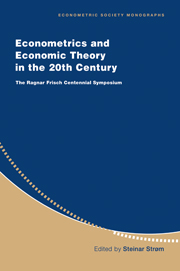Book contents
- Frontmatter
- PART I RAGNAR FRISCH AND HIS CONTRIBUTIONS TO ECONOMICS
- PART II UTILITY MEASUREMENT
- PART III PRODUCTION THEORY
- 6 Production Functions: The Search for Identification
- 7 Investment and Growth
- PART IV MICROECONOMIC POLICY
- PART V ECONOMETRIC METHODS
- PART VI MACRODYNAMICS
- PART VII MACROECONOMIC PLANNING
- Author Index
- Subject Index
7 - Investment and Growth
from PART III - PRODUCTION THEORY
Published online by Cambridge University Press: 05 January 2013
- Frontmatter
- PART I RAGNAR FRISCH AND HIS CONTRIBUTIONS TO ECONOMICS
- PART II UTILITY MEASUREMENT
- PART III PRODUCTION THEORY
- 6 Production Functions: The Search for Identification
- 7 Investment and Growth
- PART IV MICROECONOMIC POLICY
- PART V ECONOMETRIC METHODS
- PART VI MACRODYNAMICS
- PART VII MACROECONOMIC PLANNING
- Author Index
- Subject Index
Summary
Introduction
The early 1970s marked the emergence of a rare professional consensus on economic growth, articulated in two strikingly dissimilar books. Simon Kuznets, the greatest of twentieth-century empirical economists, summarized his decades of research in Economic Growth of Nations (1971). The enormous impact of that research was recognized in the same year by the Royal Swedish Academy of Sciences in awarding the third Bank of Sweden Prize in Economic Science in Memory of Alfred Nobel to Kuznets “for his empirically founded interpretation of economic growth which has led to new and deepened insight into the economic and social structure and process of development” (Lindbeck, 1992, p. 79).
Robert Solow's book Growth Theory (1970), modestly subtitled An Exposition, contained his 1969 Radcliffe Lectures at the University of Warwick. In those lectures, Solow also summarized decades of research initiated by the theoretical work of Roy Harrod (1939) and Evsey Domar (1946). Solow's seminal role in that research, beginning with his brilliant and pathbreaking essay of 1956, “A Contribution to the Theory of Economic Growth,” was recognized, simply and elegantly, by the Royal Swedish Academy of Sciences in awarding Solow the Nobel Memorial Prize in Economic Science in 1987 “for his contributions to the theory of economic growth” (Maler, 1992, p. 191).
- Type
- Chapter
- Information
- Econometrics and Economic Theory in the 20th CenturyThe Ragnar Frisch Centennial Symposium, pp. 204 - 238Publisher: Cambridge University PressPrint publication year: 1999



